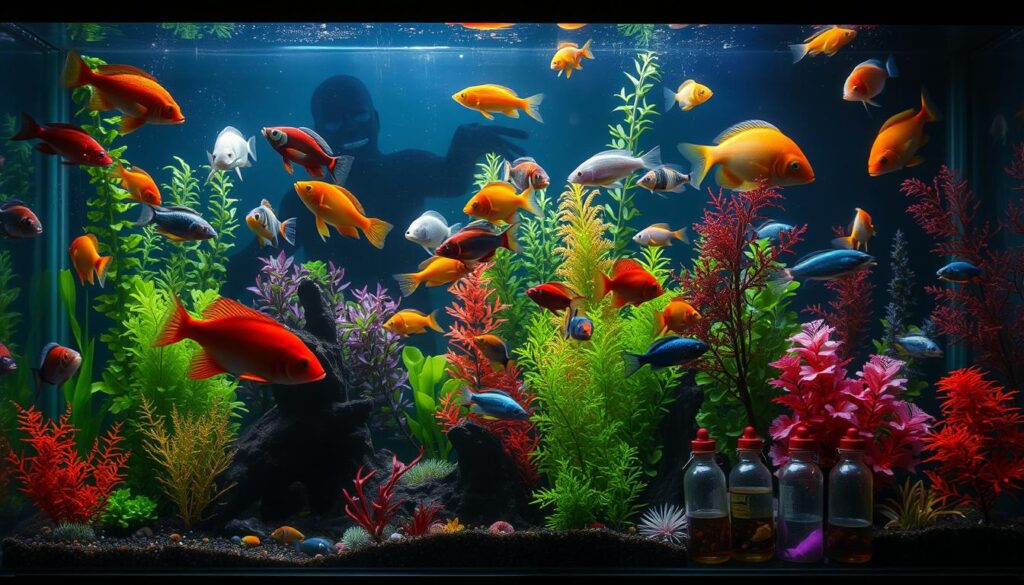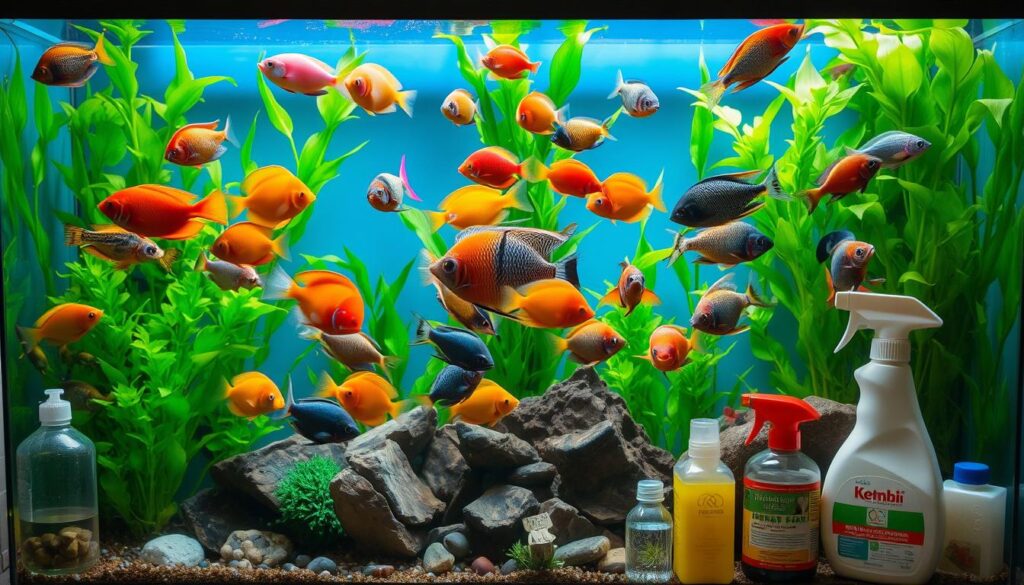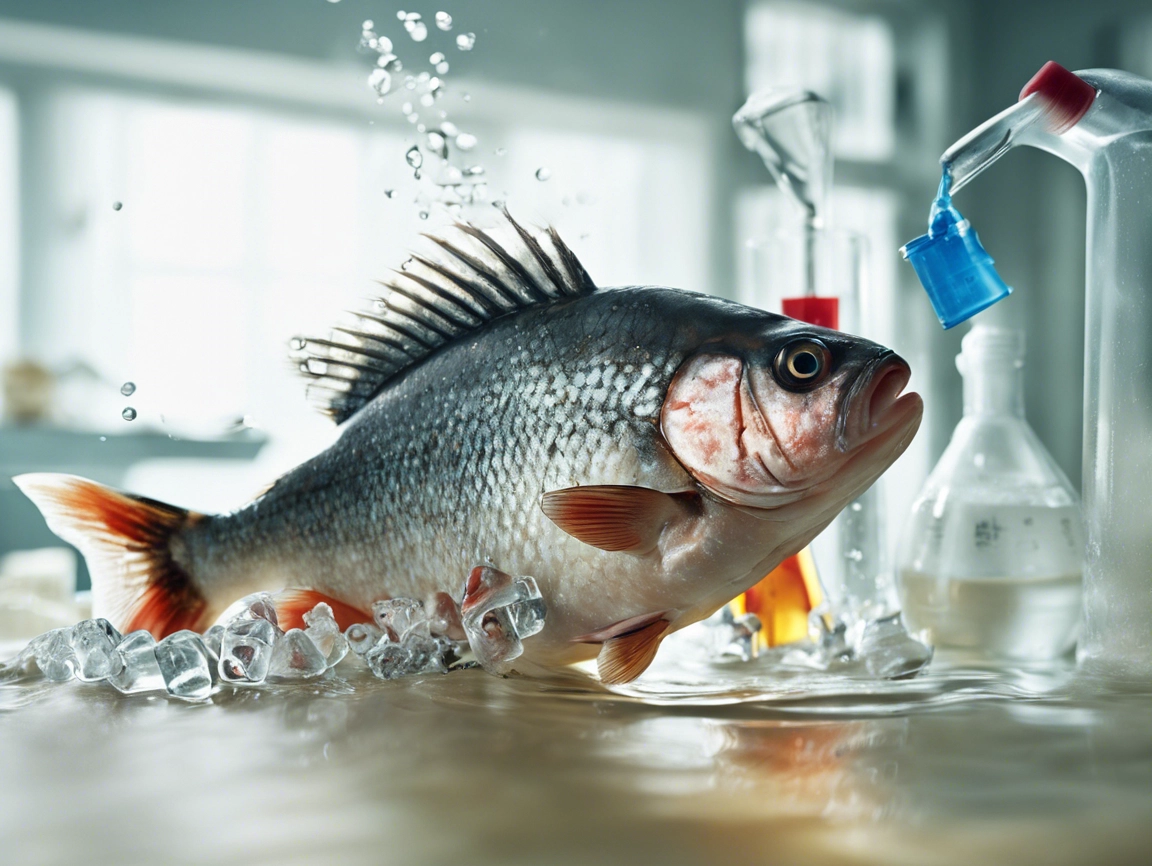Recognize the external factors that could pose a threat to your fish. The bass speaker in your living room, the nicotine in your cigarettes, hand soap or sanitizer, or vanilla-scented air freshener could all be bad for your tank. If there are any inexplicable deaths among your fish, it’s time to own up to your mistakes and quit keeping fish.
There are a couple of categories you can choose from when deciding how to decorate your new tank. We’ve selected some examples of rocks, wood, artificial coral, plants, and ornaments to get you started.
1. Daily Use Poison

Do not wash your hands and then reach into the tank. Hand soaps and sanitizing gels can harm your fish, and any residue they leave behind can damage your aquarium.
We presume that you use a separate bucket to clean your house, car, etc. For your aquarium, why not get a bucket and mug separately? The hazardous chemical residue lingers in some or all of the buckets even after they have been thoroughly cleaned.
Overmedicating your fish might have devastating consequences. A large amount of kidney damage, gill clubbing, and serious organ failure can arise from overdosing.
Insecticides and pesticides can be fatal in various ways. Make sure you close the top of your tank and turn off the air pump before applying any pesticides in your house.
Because the salt you use for cooking has the potential to build up in the tank and dehydrate your fish, it is necessary to handle fish care with prudence.
2.Air pollution

Pyrethrin, sometimes referred to as permethrin, is a component of flea and tick repellent sprays that has the ability to poison and kill fish. It is best to keep your pets out of the way of the tank and to keep them in other rooms for a few hours.
Air fresheners don’t really excite your fish, though you may want to spritz them once in a while. The chemicals and stench are extremely toxic to your fish, even in little doses, and can cause serious poisoning.
Cigarette smoke: Designate the room where your aquarium is maintained as a public area to protect your fish from the harmful effects of smoke. Stay away from smoking anywhere close to the aquarium since nicotine can harm your fish. Your fish may be harmed by the nicotine and many other chemicals used in the production of cigarettes. Never, ever think about dousing your gas tank with a cigarette.
Aromas and antiperspirants: If you manage to get some on your wrist, it’s better to avoid the tank as deodorants and other odors, such as air fresheners, can be lethal to your fish.
Varnish and paint: Everything should be removed from the area that will be coated, including your covered fish tank. It’s better to be safe than sorry.
3. Noise pollution

We hate to notify you that noise might have a significant effect on fish. It has been demonstrated that road noise, loud DJ music, and urban growth can cause acute or long-term stress in fish. A sudden, loud noise can scare fish and kill them instantly.
You may want to keep the tank away from your fish because noisy TVs and music systems can frighten and confuse them.
Try not to play with it or hit it from outside as a collision could startle or even kill fish. Tell any kids who reside there not to use their hands to bump or strike the tank. Pets who bark and doors that slam could potentially frighten your fish.
It is created from PVC and is not easy to break; the gray color isn’t easy to dirty; you’ll be able to collect it forever if you by mistake break it; no worries; a little glue will build it immediately restored; the irregular design hides glue traces well. Note: The air pump isn’t included.
How to recognize a poisoning incident?
Take care of a few items, such as:
- A shift in the color of water that signals the presence of poisons
- Fish with unusual spots, black markings, or color changes on their bodies
- Gasping for air near the surface of the tank due to a gill-irritating chemical
- Sluggishness and inactivity: While some fish are naturally slow swimmers, you should become concerned if all or most of the fish in the tank are not.
- Turbulent activity, such as efforts to get out of the tank, could be the result of an escape reaction from a harmful chemical.
How to recognize a poisoning incident?
If you believe you have been poisoned, change the water around you as often as possible. This can help to remove the poison. A major water change (50%) is best done at once, but minor modifications (20%) might be useful over time. Arcadia Polyfilters are also useful in an emergency; therefore, you should always keep one on hand.
Preventing is better than treating. Therefore, to safeguard your fish and yourself from any potential issues, you should try to avoid using or spraying any toxic chemicals near your tank.




